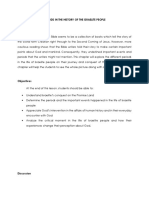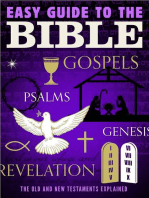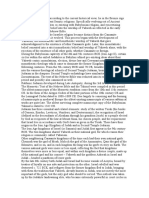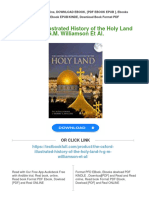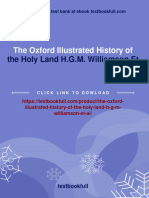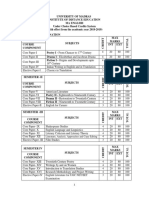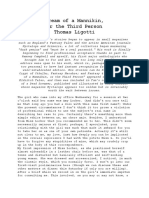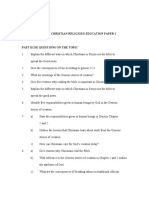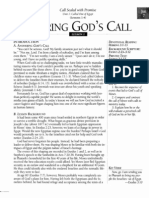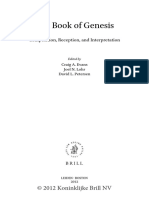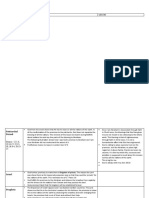Professional Documents
Culture Documents
Sandauer, A. - Reading The Bible Backwards (1976)
Sandauer, A. - Reading The Bible Backwards (1976)
Uploaded by
tordet13Original Description:
Original Title
Copyright
Available Formats
Share this document
Did you find this document useful?
Is this content inappropriate?
Report this DocumentCopyright:
Available Formats
Sandauer, A. - Reading The Bible Backwards (1976)
Sandauer, A. - Reading The Bible Backwards (1976)
Uploaded by
tordet13Copyright:
Available Formats
Arthur Sandauer
READING THE BIBLE BACKWARDS
INTRODUCTION: PROPOSALS AND ARGUMENTS
In the traditional approach, the Bible is treated as revelation,
and later as the product of history. But neither the first nor
the second can satisfy the modern reader-the first is too naive,
the second is too learned. Although the reader no longer be-
lieves that the Bible represents the infallible word of God,
he nevertheless stands at a loss before an edition which distin-
guishes its different layers by four different kinds of type. Since
he can neither read nor study it, his only alternative is to put
it aside.
Compromises of any sort are to no avail. Contemporary
theologians still believe that the Bible is the infallible word of
God, even though they do concede that it is also the product
of history. But as a product of history it cannot be infallible.
Although it still evokes emotion, it can no longer be consid-
ered the source of truth. Instead of attempting to find a work-
able compromise between the religious and the scientific inter-
pretations, why not seek a third method which would give a
new reading of the Bible?
The author of the present study proposes the adoption of a
different frame of reference. Biblical criticism starts with the
text, he proposes to start with those who wrote it. At first
glance, this would seem a purely technical innovation. But
this change in perspective involves a shift from a literary to
Downloaded from dio.sagepub.com at UNIV OF ILLINOIS URBANA on March 16, 2015
a sociological viewpoint. True, the latter is less precise and
more hypothetical in its nature, but any loss in sharpness is
made up by breadth of scope. While Biblical criticism con-
centrated on minutiae, the sociological method gives a view of
the whole and enables one to pass from commentary to cri-
ticism.
The Bible grew organically: every new layer was derived
from and influenced the one before it; each successive editor
corrected and was corrected, each was the subject and the ob-
ject of revision. The conclusion that forces itself upon us is
that the later the stratum of the Bible, the fewer revisions it
was subjected to and so the best way to understand the Bible
is to start reading it from the end. The present study, there-
fore, proceeds backwards, against the current of time.
It begins up to 621 B.C., when at the institution of Hilkiah,
the high priest of the temple of Jerusalem, Josiah, the king of
Judah, conducted a religious reform. Its purpose, as the Scrip-
tures state, was to restore monotheism. In consequence, the
altars on the high places were destroyed and their priests were
slain or deprived of the means of livelihood. The second sec-
tion describes how Hilkiah revised the old texts with the
purpose of proving that his current conflict with the priests
of the high places had its roots in an earlier time. In the third
section, we shall see how in the 10th century B.C. Nathan, the
royal tutor, attempted to establish the right of his pupil Sol-
omon to the throne of David. The fourth gives an account
of Nathan’s revision of the legend of the patriarchs. Thus
Sections I and III describe the political activity of the authors,
while Sections II and IV detail how they utilized current poli-
tical experience in the writing of history. The odd sections,
set in the 7th and in the 10th centuries B.C., are the flood-
lights, the even sections are the beams of light thrown into
a distant past.
I. SONS OF ZADOK AND THE PRIESTS OF THE HIGH PLACES (7TH
CENTURY B.C.)
Very littleis known of the history of the monotheistic dogma,
for great effort has been made to obliterate all traces of it.
Downloaded from dio.sagepub.com at UNIV OF ILLINOIS URBANA on March 16, 2015
The one irrefutable fact concerns the history of the cult, that
is Solomon’s construction of the temple of Jerusalem toward
the end of the 10th century B.C. It is not certain whether
Yahweh was worshipped there as the One God. It is certain,
however, that from the very beginning emphasis was placed on
the monopoly of the temple. For when David carried the ark
to Jerusalem and when Solomon buih the edifice to house it,
the priests who had formed one homogeneous body split into
two antagonistic groups. The first g~oup continued to make
crude offerings in the high places and to annoint the rocks and
tree stumps with oil, the second worshipped at the high altar
in the temple according to a rigorous set of rules. The first
were called the priests of the high places, the second, named
after the first high priest Zadok, were later known as Sadducees.
It ought to be made clear from the outset that the Sadducees
alone are the agents of history. It is they who used writing
and who had a permanent sanctuary where they could keep
their texts. That is why we know the conflict only from their
point of view.
For there was a conflict from the very first moment. There
is no doubt that the motives were economical because the meat
bought for sacrifice constituted an important item of the
priests’ budget. There were also political motives behind the
conflict-namely the antagonism between the Ten Tribes of
the north and the powerful tribe of Judah which dwelled in
the south. The split, which had emerged much earlier, broke
out with redoubled force after Solomon’s death. The kingdom
was divided into two: Israel with a capital ultimately established
in Samaria, and Judah with a capital in Jerusalem. The latter
was ruled by kings descended from David. Their aim was to
extend a spiritual protectorate over the whole of the divided
nation and it is toward this end that, among other measures,
annual pilgrimages to Jerusalem were instituted. The convic-
tion that the holy days can be observed lege artis only there was
firmly implanted. &dquo;Until next year in Jerusalem&dquo; the pilgrims
used to say in parting.
The kings of the northern state called Israel attempted to
oppose the monopolistic tendencies of the south with a cult
of their own and so gave their support to the priests of the
Downloaded from dio.sagepub.com at UNIV OF ILLINOIS URBANA on March 16, 2015
high places: &dquo;And Jeroboam said in his heart, Now shall the
kingdom return to the house of David: If this people go up to
do sacrifice in the house of the Lord at Jerusalem, then shall
the heart of this people turn again unto their lord, even unto
Rehoboam king of Judah, and they bhall kill me, and go again
to Rehoboam king of Judah. Where upon the king took coun-
sel, and made two calves of gold, and said unto them. It is too
much for you to go up to Jerusalem, behold thy gods, o
Israel, which brought thee out of the land of Egypt&dquo; (I Kings
12: 26-28).
Clearly therefore monotheism arose, among others, as a
result of the drive of the priests of Jerusalem toward a cen-
tralized authority. In connection witn this tendency, Yahweh
gradually rose to the rank of the supreme and later the One
God. On the other hand, to establish their legitimacy the sons
of Zadok sought to demonstrate that they were heirs of reve-
lation through an unbroken chain of tradition. They made this
the central thesis of the texts which they edited. A claim to
power determined by heredity is called legitimism and is ex-
pressed by the known formula &dquo; We, by the grace of God.&dquo;
The sons of Zadok created a legitimism of their own based
on a series of revelations, blessings and annointments that ran
from the patriarchs to themselves.
The founder of the tribe was Abraham who spoke with
Yahweh and entertained him at his table. In the course of
one of the visits, the Lord promised the old man Abraham-
who did not have an heir-a legitimate son and the land of
Canaan to his descendants. Since that time male descendants of
Abraham have worn the visible sign of the covenant’s guar-
antee on their bodies.
Charisma was transmitted in the form of a blessing. On the
one hand, it was a kind of last will and testament, the
pa-
triarch invested his firstborn, or the son he recognized as
such, with all his goods; on the other hand, the bequest was
non-material: the son fell heir to the spiritual leadership of
the tribe. Abraham blessed Isaac, who blessed Jacob, who in
turn chose Judah and Joseph out of his twelve sons. After
a break of four hundred years, when the Israelites lived in
bondage in the land of Egypt, the Lord renewed the covenant
4
Downloaded from dio.sagepub.com at UNIV OF ILLINOIS URBANA on March 16, 2015
with Moses, appearing to him in a burning bush. His wife
Zipporah circumcised their son once again.
Moses invested Joshua with charisma, he in turn bequeathed
it to the military leaders called the Judges. The last of the
judges, whom we meet in the first chapter of the First Book
of Samuel, is Eli. He performed no military function; his role
was to guard the ark. Since Eli’s sons Hophni and Phinehas
proved unworthy of their father’s office, his servant Samuel
was made the keeper of the ark and with this became the spir-
itual leader of the people.
Samuel did not transmit the leadership to his sons either
(they all proved unworthy of it), but to the Kings he annoint-
ed. The first was Saul and, after he had been rejected, David.
David was succeeded not by older sons but by Solomon who
built a temple in Jerusalem and placed it in the custody of
Zadok. From that day on, relations between the secular and
the spiritual powers rested on an exchange of services: the
&dquo;
high priest &dquo;walked before the king,&dquo; the king was annointed
by the high priest. This cooperation was the cornerstone of
their legitimism; from that day on the priests of Jerusalem were
symbolically known as the &dquo;sons of Zadok.&dquo;
We shall begin the story of their conflict with the priests
of the high places, from its final stagz, when the sons of Zadok
embarked upon the ultimate extermination of their rivals. In
621 B.C. the northern kindgom had been out of existence for a
hundred years; the majority of its popalation had been deport-
ed to Assyria; foreign armies roamed freely across Samaria.
Judah could exert no more than a spiritual influence on this
land. Necessary here was an operation that would unite the
nation. This proved to be the collection of funds for the resto-
ration of Solomon’s temple which hand fallen into sad disrepair
in the course of the four centuries since it had been built.
The Second Book of Kings 22 and 23 gives us the story:
&dquo;And it came to pass in the eighteenth year of the king Josiah,
that the king sent Shaphan,... the scribe, to the house of the Lord,
1
See Martin North, Geschichte Israels. Goettingen, 1963, p. 247 and following
regarding the attempts of Josiah, king of Judah, to recover after the fall of Assyria
at least part of the territory that had once belonged to Israel.
Downloaded from dio.sagepub.com at UNIV OF ILLINOIS URBANA on March 16, 2015
saying, Go up to Hilkiah the high priest, that he may sum the
silver which is brought into the house of the Lord, which the
keepers of the door have gathered of the people; And let them
deliver it into the hand of the doers of the work, that have the
oversight of the house of the Lord: and let them give it to the
doers of the work which is in the house of the Lord, to repair
the breaches of the house... Howbeit there was no reckoning made
with them of the money that was delivered into their hand, be-
cause they dealt faithfully. And Hilkiah the high priest said unto
Shaphan the scribe, I have found the book of the law in the house
of the Lord... And Shaphan the scribe came to the king, and
brought the king word again and said, Thy servants have gathered
the money that was found in the house, and have delivered it into
the hand of them that do the work, that have the oversight of the
house of the Lord. And Shaphan the scribe shewed the king,
saying Hilkiah the priest had delivered me the book and Shaphan
read it before the king...
&dquo;And it came to pass, when the king had heard the words of
the book of the law, that he rent his clothes And the king command-
ed Hilkiah the priest, and Ahikam the son of Shaphan, and Ach-
bor the son of Michaiah, and Shaphan the scribe and Asahiah a
servant of the king’s, saying, Go ye, 2nquire of. the Lord for me,
and for the people, and for all Judah, concerning the words of
this book that is found: for great is the wrath of the Lord that
is kindled against us, because our fathers have not hearkened unto
the words of this book...
&dquo;And the king commanded Hilkiah the high priest, and the priests
of the second order, and the keepers of the door, to bring forth
out of the temple of the Lord, all the vessels that were made for
Baal, and for the grove, and for all the host of heaven... And he
brake down the houses of the sodomites, that were by the house
of the Lord, where the women wove hangings for the grove. And
he brought all the priests out of the cities of Judah, and defiled
the high places where the priests had burned incense... Neverthe-
less the priests of the high places came not up to the altar of the
Lord in Jerusalem, but they did eat of the unleavened bread among
their brethren. And he defiled Topheth, which is in the valley of
the children of Hinnom, that no man might make his son or his
daughter to pass through the fire to Molech. And he took away
the horses that the kings of Judah had given to the sun, at the
entering in of the house of the Lord, by the chamber of Nathanme-
lech the chamberlain... and burned the chariots of the sun with
fire... And the high places that were before Jerusalem, which were
Downloaded from dio.sagepub.com at UNIV OF ILLINOIS URBANA on March 16, 2015
on the right hand of the mount of coruption, which Solomon the
king of Israel had builded for Ashtoreth.. did the king defile...
&dquo;
And as Josiah... sent, and took the bones out of the sepulchres,
and burned them upon the altar, and polluted it, according to the
word of the Lord, which the man of God proclaimed, who proclaim-
ed these words. Then he said, What title is that that I see? And
the men of the city told him, It is the sepulchre of the man of
God, which came from Judah, and proclaimed these things that
thou hast done against the altar of Bethel. And he said, Let him
alone; And all the houses also of the high places that were in the
cities of Samaria, which the kings of Israel had made to provoke
the Lord to anger, Josiah took away, and did to them according
to all the acts that he had done in Bethel. And he slew all the
priests of the high places that were there upon the altars, and
burned men’s bones upon them, and ieturned to Jerusalem. And
the king commanded all the people, saying, Keep the passover
unto the Lord your God, as it is written in the book of this con-
venant. Surely there was not holden such a passover from the days
of the judges that judged Israel, nor in all the days of the kings
of Israel, nor of the kings of Judah.&dquo;
Let us begin with the author. The flat uninspired style and
the linear character of the narrative suggest the idea that these
are fragments of annals written by Hilkiah, the high priest of
the temple. The author’s identity is also borne out by the
nature of information offered (knowledge of the streets, the
inhabitants and the addresses) and by the narrator’s specific
bias.
The events described are even more baffling. King Josiah
sent Shaphan the scribe to see what progress had been made
on the reconstruction of the temple. The king forbade him,
however, to make a reckoning of the money that had been
collected for, he emphasized, he trusted Hilkiah implicitly. Some-
one, so it seems, had strenuously demanded such a reckoning
since the author felt it necessary to make the point that the
king had given up the idea.
Far more surprising is the high priest’s reaction to the
visit. In the answer he gives the king’s scribe, he does not
speak of the restoration of the temple but of a book he had
discovered. Shaphan takes the book to the king and reads it
to him. The king reproaches himself for not having taken
Downloaded from dio.sagepub.com at UNIV OF ILLINOIS URBANA on March 16, 2015
heed of the word of the book (how could he when he had no
knowledge of it?). Under the influence of the book, the king
then embarks upon a policy of religious reformation.
The reform, according to the Scriptures, was preceded by
a period of more than fifty years during which the people had
abandoned their faith. We learn of the extent of the evil ways
into which the people had fallen from the description of the
abolition of idolatry. It appears that for eighteen years King
Josiah ruled over a city where even the cemeteries, institutions
that obviously existed much longer than a half a century, were
pagan in character,’ where children were burned alive as an
offering to Moloch, where the high priest ministered in a
temple in which the horses of the sun were stabled and where
sacral debauchery was practiced.
All this falls into place the moment we accept that Josiah
did not restore monothesism, as the Scriptures would have it,
but that he established it. It seems that other deities, beside
Yahweh, were worshiped in the temple of Solomon, that the
priests who served the different gods and played a part in
collecting the funds for the restoration might have demanded
a reckoning from Hilkiah and requested a part in the adminis-
tration of the reconstructed temple. They had every right to
it. In answer Hilkiah produced the most dangerous weapon: a
book which prescribed the aboliton of their ritual. Biblical
scholars have known for a long time that the book in question
is the Book of Deuteronomy, the fifth and most rigorous part
of the Pentateuch.~ All evidence points to the fact that its
editor was Hilkiah himself.
Josiah’s acceptance of the book spelled the end of the semi-
pagan ritual of the high places. The priests of northern Samaria
were slain, those of southern Judah were forced to move to
Jerusalem. They were promised a kind of commissary where
&dquo;they did eat of the unleavened bread among their brethren&dquo;
2 "
Plundering the old cemeteries, Josiah spared the sepulchre of the man of
God, which came from Judah ", and proclaimed these things that he had done.
This is a reference to I Kings 13 where a man of God comes to Jeroboam, king
of Israel in the 9th century B.C., to prophesy Josiah’s reform. The prophesy or
" "
vaticiuium ex eventu is obviously an addition made by Hilkiah who in this
fashion wishes to legalize ex post his actions.
3
See Otto Eissfeldt, Einleitung in das Alte Testament, Tübingen, 1956, p. 278.
Downloaded from dio.sagepub.com at UNIV OF ILLINOIS URBANA on March 16, 2015
(II Kings 25: 9) although they were not entitled to participate
in the worship. The of
sons Zadok won a decisive victory which
was sealed by a passover observed with great pomp and cere-
mony. &dquo; Surely there was not holden such a passover, &dquo; the author
records with triumph, &dquo;from the days of the judges that judged
Israel, nor in all the days of the kings of Israel, nor of the kings
of Judah&dquo; ( II Kings 23 : 22 ).
II. THE POLICY OF THE PRIESTS OF JERUSALEM AND THE FIRST
CHAPTER OF THE BOOK OF SAMUEL (7TH-11TH CENTURIES B.C.)
When the opposition had been put down, the priests of Jerusa-
lem were able to exercise an unlimited control over Judah;
this domination was to survive not only Judah but also the
priests themselves; its final result was to be the Jewish nation.
Their spiritual dictatorship was to produce certain enduring
forms of existence which enabled the Jewish people to survive
the thousand years of the Diaspora and bondage. On the other
hand, the monstrous quantity of commandments and injunctions
they raised like a wall around the people was to lead in effect
to the petrification of culture.
The process of petrification, which might be called Deuterono-
mization after the work marking its beginning, extended in two
directions. In its forward extension it cut a gash through the
psyche of the subsequent generations and, in its backward ex-
tension, against the current of time, it adapted old tradition
to new exigencies. The priests of Jerusalem, as we have seen
in the example of Josiah’s reform, sought to produce the illu-
sion that they were not innovating but restoring, that every
upheaval was a reversion, that Judaism had been from the
first what it was now, that it had always been so. That explains
their arduous concentration on the revision of the old texts.
We cannot but admire what they accomplished: they had
preserved for posterity a treasure of incalculable value. Yet we
cannot help but regret that the original texts have not survived.
The control they exercised was autocratic, the sifting was con-
ducted with rigid scrupulousness. And so the legends that have
come down to us are deformed. It is not a concidence that the
Downloaded from dio.sagepub.com at UNIV OF ILLINOIS URBANA on March 16, 2015
masterpiece of the Bible is the &dquo;Genesis; &dquo; its venerable hoari-
ness protected it from the obtrusive innovations of the Deuter-
onomists. It is not a concidence either that the second master-
piece are &dquo;The Memoirs&dquo; which close the Books of Samuel, a
composition of a man who was not constrained by didactic aims,
the work of a Biblical Shakespeare who, if he believed in
Yahweh at all, it was surely not in the Yahweh of culinary
recipes but in the Yahweh who manifested himself in the thunder
and falling boulders on the mount of Seir.
The four sections of this study bring out the contrasts be-
tween two mentalities: the monotheistic and the pre-mono-
theistic. The first two sections deal with the first, which found
its continuation in Judaism later, the last two describe the
&dquo;
second whose expression are &dquo;The Memoirs&dquo; mentioned above.
The representative of monotheism is the instigator of Josiah’s
reform, Hilkiah; the representative of pre-monotheism is Solo-
mon’s teacher Nathan, called a prophet by later generations.
As we describe each of them, we shall also discuss the manner
in which they adapted history to the current situation.
The beginning of the First Book of Samuel bears clear marks
of Deuteronomic revision. The action is set in Shiloh, a city
where the ark was housed at the time, that is in the 11 th
century B.C. The central issue is the antagonism of the two
lines of priests-the sinful and the virtuous. The first is repre-
sented by Eli and his sons, guardians of the object of national
devotion, the second by Samuel who, owing to their wicked-
ness, takes that office from them.
The author of this section was an experienced writer. He
took care that what he wrote should conform with the forerun-
ning historiography. The Book of Samuel is preceded by the
Book of Judges, a work written in a totally different spirit.
In Judges the action is not centered around the ark, which is
hardly mentioned at all; Yahweh is not present in the ark but
in the mount of Seir; the judges are not priests but military
leaders. The Book of Samuel, on the other hand, is a theocratic
work. Authority comes from God, the guardian of the ark
is the Lord’s deputy who transmits authority to the kings.
There is no connection between the Book of Judges and
the Book of Samuel; each posits a different outlook. In order
10
Downloaded from dio.sagepub.com at UNIV OF ILLINOIS URBANA on March 16, 2015
to link the two, it was necessary to resort to a device which
testifies to the author’s literary skill. The introduction describes
Eli and his sons solely as priests: Eli prays to the Lord, and
his sons, as befitted His poor servitors, pounce greedily on the
scraps of flesh offered in sacrifice. It is from Eli’s epitaph that
finally we learn that &dquo;he had judged Israel forty years&dquo; (I Sam-
uel 4 :18 ); not until the very last moment do his two sons, mean
grubbers that they were, take the ark of the covenant and
set out for the battlefield as befits true warriors. Thus the two
characters are suddenly transformed from priests to judges, an
irrelevance that was necessary in order to build a bridge be-
tween the two books.
The author of the beginning of the First Book of Samuel
was a priest. To him the ark was the center of the world. He
gives a detailed description of its ’strange adventures&dquo;: how
it was taken by the Philistines who were smitten with hemorr-
hoids in their secret parts, how the Philistines returned the
ark with costly gifts and the images in gold of their hemorrhoids,
how they laid the ark on a cart pulled by two milch cows and
sent them where they might go, how the cows headed straight
for the frontier and how David carried the ark to Jerusalem
in a ceremonious procession, dancing and playing before it.
David’s chief virtue in the eyes of the author lay in his de-
votion to the ark. The author himself believed in its miracul-
ous power. He believed that there is no better prescription for
barrenness than to swear to dedicate one’s expected son to the
service of the ark. Hannah, whom Yahweh awarded with a son,
does so; her son later became the prophet Samuel.
The author had a profound knowledge of the cult; he was
particularly well versed in the practices of the priests of the
high places. He observed how with hands shading their eyes
they peered impatiently into the dust in the roads as they
looked out for the pilgrims. And small wonder! They were en-
titled to a portion of the flesh sacrificed to the Lord and to
lie with the wives of the pilgrims. In the First Book of Sam-
uel, the sons of Eli pulled scraps from the seething pots
and lay with the women who came to Shiloh. To spend the
night in the tabernacle where the Lord would descend to them
11
Downloaded from dio.sagepub.com at UNIV OF ILLINOIS URBANA on March 16, 2015
in the guise of His priest was a remedy for barrenness often
resorted to by women pilgrims.
The beginning of the First Book of Samuel transfers into a
distant past the polemic of the sons of Zadok against the priests
of the high places. This fact is most clearly apparent in the
prophecy of &dquo; a man of God&dquo; who came to Eli to tell him of
the disasters that would fall on the heads of his sons. The
office would be taken from the house of Eli and the Lord
would choose a priest and build him a sure house where he
would &dquo;walk before the king.&dquo; The descendants of Eli would
come to that priest and beg him for bread, silver and for
one of the priest’s offices (I Samuel 5:27-36). There is a triple
allusion here: to the prophet Samuel who was to succeed the
sons of Eli, to Zadok the first high priest of the temple of
Solomon, who lived a hundred years later, and to Hilkiah,
whom, after Josiah’s reform five hundred years later, the ex-
pelled priests begged for money, bread or an office. We have
here an example of a pseudoprophecy or &dquo;vaticinium ex even-
tum&dquo; whose purpose is to legalize current policy.
There is ample evidence, however, that the original story
did not take cognizance of the &dquo;Eli-Samuel&dquo; antithesis, that
Samuel was actually extraneous to it. As a matter of fact Han-
nah’s son should have been called Saul and not Samuel. The
Bible derives the names of children from the mother’s words
spoken before their birth. The word that appears on Hannah’s
lips repeatedly is &dquo;shaol&dquo;-to ask for. Her son is therefeore
&dquo;
Saul (Shaoul)-or &dquo;asked for.&dquo; It might be that in the original
version he was the fruit of sacral debauchery begotten by Eli’s
two sons. The information that the two priests &dquo;lay with the
women that assembled at the door of the tabernacle of the
congregation&dquo; (I Samuel 2 : 22 ) would therefore prove to be a
link in the original action. This would also explain why at
first the Scriptures place the sons and not their father at the
center of the events. We read in I Samuel 1:3 &dquo;And the two
sons of Eli, Hophni and Phinehas, the priests of the Lord, were
there. &dquo;
That Samuel was introduced at a later date is also indicat-
ed by the fact that there are parts where his biography seems
a copy of that of Eli. He too had two sons who made evil use
12
Downloaded from dio.sagepub.com at UNIV OF ILLINOIS URBANA on March 16, 2015
of their office (I Samuel, 8: 2, 3). He too was unable to find
a worthy heir in his family and so was forced to seek a successor
elsewhere. Even the name sounds fictitious. Samuel means
&dquo;The name of El&dquo; or God; it is too didactic for a real name.
Besides it was so chosen that it may also be derived from the
word &dquo;shaol&dquo; which Hannah repeated.
Many arguments lead us to assume that, wishing to move
contemporary conflict into the distant past and to introduce
into it the current antithesis of the two lines of priests, the
author of the 7th century B.C. had added the figure of Samuel
to the original story.
III. THREE SONS OF THE UNLOVED WIVES AND THE BELOVED
BASTARD (10TH CENTURY B.C.)
The end of the Books of Samuel’ and the first chapter of the
Books of Kings are clearly the work of one author. They are
in fact an eye-witness account of events by an author who, as
Eduard Meyer writes, &dquo;betrays a deep knowledge of what
happened at the royal court in David’s time and who must
have been in close touch with him. &dquo; 5 The composition is re-
markable for its unity of subject. It deals with the struggle
for succession between David’s four sons: Absalom against
Amnon, Solomon against Adonijah. The struggle has a pre-
history, namely the sinful love of the king for Bathsheba, the
wife of the Hittite Uriah.
The fruit of what was the greatest passion of David’s life-
Solomon-was to succed him on the throne even though his
accession to royal power was illegal. Solomon was one of the
youngest children, the tenth, and so long as his older brothers
lived he could not inherit the throne; and Adonijah,6 we know
was alive. The law clearly stated that the younger sons of fa-
vorite wives may not be given preferential treatment.’ The only
4
Notably I Samuel 9 to 20. Chapters 21 to 24 are unanimously considered by
the Biblists as later additions.
5
Geschichte des Altertums, 1931, Vol. II, 2, p. 285.
6
The Scriptures remain silent regarding the fate of the remaining brothers.
7 "
This was to be formulated later in Deuteronomy 21: 15, 16 If a man have
two wives, one beloved, and another hated... and if the firstborn son be hers
13
Downloaded from dio.sagepub.com at UNIV OF ILLINOIS URBANA on March 16, 2015
basis for Solomon’s claim to the throne was the fact that David
promised his beloved wife Bathsheba to make Solomon his
successor.
&dquo;
We might begin with the author of &dquo;The Memoirs.&dquo; There
have been various suppositions regarding his person. Some have
sought to identify him with Zadok’s son Ahimaaz, others with
the high priest Abiathar who was reposed by Solomon for
&dquo;
being a sympathizer of Adonijah.’ &dquo;HP gazes upon the events,&dquo;
Eduard Meyer says of the author, &dquo;with cold objectivity, even
with supercilious irony... Religious constructions of any tinge
and any idea of supernatural providence are totally alien to
him... He presents events objectively as befitted an eye-witness.
Nemesis emerges from the very development of events. It
would seem from the above that the narrator could not be
&dquo;
a priest, he was too secular in his outlook.&dquo;
He draws his characters without illusion-cynically and in a
modern style. We might take David, a later day ideal of a
monarch, as an example. During Uriah’; absence, who was away
fighting at the front, David took his wife to his house. When
he learned that she was pregnant, he summoned her husband
to establish an alibi. After hearing his report from the front,
&dquo;
David bade him go home to wash his feet. &dquo; But Uriah was
not eager to wash his feet preferring to sleep at the door of
the king’s palace than to lie at the slide of his wife. The king
then summoned him, entreated, offered gifts and made him
drunk but to no avail. Uriah replied, &dquo; the servants of my lord
are encamped in the open field; shall I then go into mine
house, to eat and drink and to lie with my wife?... I will not
do this thing&dquo; (II Samuel, 10:11 }. The king gave up further
attempt and sent his rival to the front giving him a letter in
which he instructed Joab that Uriah be sent to his doom. In
his last word this same David annulled the pardons he had
granted during his lifetime. His successor Solomon must deal
with the adversaries whom he had to spare for one reason or
that was hated: Then it shall be, when he maketh his sons to inherit that which
he hath, that he may not make the son of the beloved firstborn before the son
of the hated."
8
These hypotheses are enumerated by K. Budde in the commentary Die
Buecher Samuel, 1902, p. 17.
14
Downloaded from dio.sagepub.com at UNIV OF ILLINOIS URBANA on March 16, 2015
another. Yet the same David wept at the news of Absalom’s
defeat instead of rejoicing at his own victory over the son he
lost. Is he a villain or a hero? It does no good to ask because
the memoirist does not evaluate, he simply chronicles the events
as they happened.
With one exception only he does not relate &dquo;guilt and pun-
&dquo;
ishment.&dquo; The Deuteronomists had a good deal of trouble
with his memoirs later; they excluded them from the Biblical
canon and then restored them. &dquo;ThP story spoke,&dquo; Budde, a
scholar who has reconstructed the history of that fragment
with a great degree of probability, explains, &dquo;of drastic matters
which showed David, the national hero, in a bad light.&dquo; That
they should not particularly like this masterpiece, shorn as it
was of all prejudice, is not at all surprising. The surprising
thing is that they restored it.
This might be accounted for by the fact that it contains a
section which differs from the rest of &dquo;The Memoirs;&dquo; this
fragment constitutes the exception referred to earlier. Chapter
12 of the Second Book of Samuel, where it is found, is com-
posed of two parts. The purpose of the first (12: 1-15a) is to
demonstrate that the misfortunes that descended upon the
house of David were a punishment for the sin he committed
with Bathsheba. &dquo;A man of God&dquo; appeared before the king.
This time it was the prophet Nathan. He announced that Da-
vid would be punished for his sin. He had taken Uriah’s wife
secretly but his wives would be taken from him before the
eyes of the people,’ his sons would be killed in fratricidal battle
and Bathsheba’s child would die. But the prophet softened at
David’s first words of remorse and predicted that he would be
forgiven.
Actually Nathan was Solomon’s teacher. In the conflict with
Adonijah he was his pupil’s most faithful mainstay. It was
Nathan who induced Bathsheba to tell the old king of Adoni-
jah’s usurpation of the crown and to prevail upon him to name
Solomon his successor: a moment later Nathan came before
the king to confirm her words. In later ages, when his figure
9
This is an allusion to Absalom’s sexual prowess. He was to possess ten of
his father’s concubines on the palace roof to the accompaniment of applause of
the enthusiastic mob.
15
Downloaded from dio.sagepub.com at UNIV OF ILLINOIS URBANA on March 16, 2015
became surrounded with legend, he received the epithet &dquo;proph-
et. &dquo; &dquo; This would explain the role attributed to him in the
mystical passages discussed before. Based on the principle of
pseudo-prophesy they are clearly a later addition.
Equally balling, though for other reasons, is the next sec-
tion of the chapter (v. 15 b-25) which describes the death of
Bathsheba’s illegitimate child. Yahweh, in the words of &dquo;the
man of God,&dquo; promised David that he would make up the loss
of the child. Indeed, upon the death of Uriah and marriage to
Bathsheba, a legitimate son Solomon was to be born. From
the point of view of plot construction, the description of the
death of the first child, remarkable though it is in the literary
sense, is totally unnecessary. The Bible had not habituated us
to scenes from the lives of infants and so there must have been
some other aim in introducing the account. It might be assumed
that the first child did not die at all and that this child was
Solomon.
But was it fitting to admit that the successor to the throne
was a bastard? It was in the interest of the state to allay suspi-
cion on that point. The author therefore pretends that the
child had died and that Solomon was born after the union
between David and Bathsheba had bcen legalized. This would
explain the puzzling fact that Nathan gave Solomon a second
name, calling him Jedidiah, &dquo;beloved of Yahweh.&dquo; The apo-
tropaic nickname was designed to avert the evil spell that pub-
lic opprobrium could have cast upon the the child of sin; the
custom of giving the bewitched child a second name in order
to mislead the demon is practiced by the Jews to this day.
&dquo;
Thus, the author of &dquo;The Memoir can be neither Ahimaaz
nor Solomon’s enemy Abiathar but someone who was wholly
dedicated to him, notably his teacher Nathan. It is not irrele-
11
vant to mention the fact that the &dquo;Chronicles,&dquo; written at
a much later date, speak of him as of the author of the &dquo;His-
tory of David,&dquo; a work which has been lost. It is likely that
10
The word " prophet " had a different meaning in the 10th century than it
had later. It did not denote " a man of God " but an ecstatic dervish (see scenes
from the life of Saul).
11
Written about the mid 4th century B.C., the work contains many earlier
data.
16
Downloaded from dio.sagepub.com at UNIV OF ILLINOIS URBANA on March 16, 2015
&dquo;
&dquo;The Nlerr oirs&dquo; are the surviving remnants of that history.
The writei lived in the 10th century B.C.,, a time when ac-
cording to the assumptions of Biblical scholars, an anonymous
Yahwist also flourished. It was he who &dquo;on the basis of the
treasury of folk legends laid the foundations for the principal
stories of Genesis, including among others, the story of Re-
bekah and Joseph.&dquo; 12 Since it is highly improbable that two
authors of comparable genius lived in one and the same era,
one is tempted to identify them with each other. The tempta-
tion is all the greater as certain stotjes in Genesis seem like
a mythical transposition of the kind of observations the author
could have made at first hand at David’s court. We might turn
now to see to what extent this temptation finds support in
fact.
IV. THE POLICFES OF DAVID’S COURT AND THE BOOK OF GENESIS
(10TH-16TH CENTURIES B.C.)
The stories of Genesis do not represent a free play of imagi-
nation ; they reflect a sum total of knowledge, about the world
and are typical in character. The old author packs the genealog-
ical tree with everything he knows about the enthnography
and psychology of neighboring people and others. Since there
are three linguistic families within the compass of his expe-
rience, notably Semitic, Japhetic and Hamitic, the patriarch
Noah is given three sons, Shem, Japhcth and Ham. Since Ish-
maelite brigands, mixed with Egyptizns, camp out in Sinai,
Ishmael when he is cast into the wilderness marries an Egyp-
tian woman and becomes a roving bandit. Since Israel broke
up into twelve tribes, the patriarch Jacob-Israel must necess-
arily have twelve sons and so on.
The twelve biographies are ethnographic in character; they
are in fact the histories of twelve separate groups. And so the
story of Jacob’s curse of Reuben, Simeon and Levi, the three
oldest sons born of the unloved Leah, for their wicked ways,
is in fact the history of the three tribes. They were considered
12
Elias Auerbach, Wüste und heiliges Land, Berlin, 1932. Auerbach believes
that Abiathar is identical with the "Yahwehist " author of " The Memoirs ".
17
Downloaded from dio.sagepub.com at UNIV OF ILLINOIS URBANA on March 16, 2015
the oldest for they had settled in Canaan earlier than the
others. Only remnants of these tribes were extant at the time
of the writing of Genesis so it might be said that they were
indeed cursed.
The two most powerful tribes in the days of David were
those of Judah and Joseph: the nrsi was preeminent in the
south, the second in the north. Throughout his life David was
locked in contest with the separatist tendencies of the ten north-
ern tribes, the most powerful of which were the Ephraim-
ites. 13 David’s purpose in moving the capital from the south to
centrally located Jerusalem, was to consolidate the state whose
existence was threatened by the trend toward decentralization.
The situation is mirrored in the author’s depiction of the death-
bed scene of Jacob-Israel. After cursing the three oldest sons,
he extols the future greatness of Judah and Joseph. Since
Judah was the oldest and since Joseph was his most beloved
son, Jacob divided the birthright equally between the two.
By emphasizing that in his last testament Jacob had made
Joseph equal to Judah, or the north to the south, the author
clearly sought to follow the policies of the throne and to pla-
cate the tribes of the north. The latter were irritated by the
fact that David, born in Bethlehem, the land of Judah, hence
a representative of the south, had dethroned Saul who came
from the north. &dquo;We have no part in David&dquo; (II Samuel, 20:1},
said the Benjamites, the kin of the deposed king Saul. In de-
fense of David’s interest, the author created a new fictitious
geneaology in the light of which David although born in Be-
thlehem-Judah was an Ephrathite by descent.&dquo; The south and
the north were therefore united in his person.
13" "
Ephraim " was one of two halves of Joseph’s tribe, the other was Ma-
nasseh ". The Manassites settled earlier, but the Ephraimites were numerically
stronger. This balance of power is expressed in the story where Joseph brings
his two sons, Ephraim and Manasseh, to be blessed by his father Jacob. He
places them in the order of their birth: Manasseh on the right and Ephraim on
the left. But Jacob deliberately guides his right hand so it rests on Ephraim’s
head and by this token Ephraim receives the birthright.
14
See I Samuel 17:12. This is the author’s hypothesis. Biblical scholars
assume that the word Ephrathite stands here for the inhabitant of Bethlehem
which is also called Ephratah in several places of the Bible. We feel that these
are additions made at a later date by authors who wished to impart meaning
to an epithet that they no longer understood.
18
Downloaded from dio.sagepub.com at UNIV OF ILLINOIS URBANA on March 16, 2015
The motif of the infraction of the principle of primogeniture,
a right which is of basic importance t J dynastic succession, re-
curs with astonishing persistence in Genesis. The law is violat-
ed by Abraham when, for the benefit of his younger son Isaac,
he sends Ishmael away from him; Isaac gives Esau’s birthright
to Jacob and finally Jacob raises Joseph above his brethren.&dquo;
And as Joseph so Solomon is a younger son of a beloved wife.
He too is advanced not in accordance with the law and, to
make the analogy complete, at the expense of the three oldest
brothers. As Reuben, Simeon and Levi had, by drawing upon
their heads the curse of their father, made way for Joseph,
so Amnon, Absalom and Adonijah had to leave the road clear
for Bathsheba’s son Solomon.’6
The similarities are too great to be attributed to coinci-
dence. In composing Genesis the author seems to have borne
in mind the events he had witnessed. It seems highly probable
that the reason why the breach of the right of primogeniture
was brought up with such obsessive persistence was to point to
the fact that since the patriarchs had indulged their paternal
prejudices, then the contemporaries have every right to do so.
The deciding factor in exceptional cases, such as the designa-
tion of the leader of the people, should be not physical chance
but choice based on divine guidance. Not primogeniture but
spiritual qualities, which in the given instance were represented
by the author’s pupil Solomon, predestined him for the role
of ruler.
CONCLUSION: LITERATURE AND THE INFINITE (20TH CENTURY
A.D. ~ 00 )
With the belief in El Olam, the One God whose attributes
are eternity and omnipresence (the Hebrew Olam means both
15
The motif of infringement of the right of primogeniture appears also in
the story of Ephraim and Manasseh and in the story of the travail of Tamar.
Zarah put out his hand first but drew it back and Pharez, the younger of the
two, made the breach first. (Genesis 38: 28-30).
16
Even the sin of Reuben, who lay with Jacob’s concubine, has its archetype
in Absalom’s sin.
19
Downloaded from dio.sagepub.com at UNIV OF ILLINOIS URBANA on March 16, 2015
universe and eternity), there emerged a new idea whose mean-
ing was to attain crucial importance and to extend beyond the
province of religion: infinity. The word was not familiar to the
ancients, Aristotle did not know it,17 it was unfamiliar in the
Middle Ages as well. Its meaning, together with the antinomies
it implies, was to emerge in full in modern times.
The term originated in the Bible, the Biblical Yahweh is or
rather became infinite, not only in the physical but also in the
moral sense. &dquo;Became&dquo; because He did not emerge at once as
a perfect and eternal being, but grew perfect and eternal by a
gradual process. Earlier layers describe Yahweh as an unpredic-
table kobold. It was the prophets who finally invested Him
with the attributes of omnipotence, omniscience and unbounded
goodness. Had He been invested with these attribuites earlier,
His greatness would have overwhelmed every story, foiled
every action. His omniscience nullifi,.s man’s free will, His om-
nipotence any action (if He had been truly omnipotent the
first parents would have never left the Garden of Eden and
history would never have started). His unbounded goodness
precludes the existence of Evil. Contact between the infinity
of God and the finite nature of man is extremely difficult.
How is Evil, a necessary condition of any action, possible
in a world governed by a Perfect Being? The question occurs
in the Bible from the story of original sin to the Book of Job.
We, the inhabitants of a world which had once made claim
to perfection, know it only too well. Since Evil cannot come
from an infallible authority, it must be the work either of an
external agency or of internal provocation.
The role of that agency in primitive Judaism was performed
by the worshipers of foreign idols of the Baalim and the Mo-
lochs. Old Biblical authors did not deny the existence of these
gods. They are an &dquo;abomination&dquo; co them but they are real.
It was not yet monotheism but monclatry. Among the gods
17 " "
According to Aristotle the space of the whole universe is finite... Werner
"
Heisenberg writes, It exists thanks to the existence of tensile bodies... There
is no space where there are no bodies." (Physics and Philosophy). On the whole,
classical antiquity, although the term limitless space appears in it from time to
time, concentrated its attention on objects and phenomena. This was also a
characteristic of ancient art which had not yet developed the concept of infinite
space behind the objects.
20
Downloaded from dio.sagepub.com at UNIV OF ILLINOIS URBANA on March 16, 2015
Yahweh was the only one worthy ~,i worship. The story of
original sin is not consistently monotheistic in character: Yah-
weh is the One God,&dquo; the serpent is not yet Satan but a
not
being independent of God.
For Satan, who was to emerge onlv with the rise of a logi-
cally developed monotheistic system, has to God an attitude
of, we might say, seditious dependence. There is an excellent
term for him in the language of politics-provocateur. He pro-
vokes citizens to sin, living under an authoritarian government
in order to test their loyalty. Does he act at the behest or
only with the consent of Yahweh? The later Deuteronomists
could not afford to concede that it was Yahweh who tempted
man; they were too timorous. The &dquo; monolatrist&dquo; of the much
earlier Book of Samuel can still afford to do so. We read in
II Samuel 24:1 that, angered at Iscael, Yahweh had tempted
David to sin, that is to number Israel and Judah,&dquo; but when
he obeyed the Lord punished him severely. 20
However, in the Book of Job,21 composed a couple of centu-
ries later, it is not Yahweh but Satan who, with the Lord’s
consent, leads man into temptation. Satan wished to prove to
God that He can rely on no man, not even on &dquo; the perfect and
upright&dquo; Job. Knowing of Yahweh’s omniscience, how could
Satan challenge Him and knowing of his omnipotence, how
could he rebel against the Lord? The fact is that Satan is an
illogical creature; will does not go hond in hand with know-
ledge. In this respect he is a forerunner of the modern con-
tradiction that rives the human soul, the forerunner of the
Kirillovs and Lafcadios.
We have given here a fairly cursory review of the problems
raised in the human mind by the omniscience, omnipotence and
unbounded goodness, that is by the moral aspect, of the In-
finite Being; no less problematic is the physical boundlessness,
18 " "
the man has become as one of us (my emphasis) (Genesis 3:22).
...
19
Budde (op. cit., p. 328) explains the condemnation of the numbering of
the people by the fact that " Yahweh, who gives and takes life, cannot abide
to have anyone count the souls," and by the fact that " the natural aversion of
the population for the census, which could mean new burdens, assumed the
character of a religious injunction."
20 "
The same story is repeated literally by the Chronicles ", written a few
centuries later. But here the instigation of Yahweh is replaced by that of Satan.
21
Written about the 4th century B.C.
21
Downloaded from dio.sagepub.com at UNIV OF ILLINOIS URBANA on March 16, 2015
especially that of time. Wishing to be as eternal as the being
that is object, monotheism must resist historical treatment. That
there was a desire to establish monotheism as the primal reli-
gion is evident from its very substance; the purpose of the re-
visions we have discussed was to prove this point. They were
made, we might note here; contrary to all evidence. The foun-
ders of monotheism had a multitude of examples around them
-cemeteries and altars, rocks and tree stumps-all these test-
ified to the contrary. Why, their own names bore the marks
of paganism.’ Yet, in order to protect their religion they had
to deny the obvious. Yahweh, if He was indeed the eternal
God, El Olam, could not appear to the people late in history.
He had to be with the people from the beginning.
But is not our assertion contradicted by fact? In early Ju-
daism, God appeared on earth time and again. In Christianity,
which is derived from Judaism, He even came down on earth
in a given year. We have said that contact between eternity
and time, between God and man is difficult, we did not say
that it was impossible. Aware of the difficulty, Christianity
delegated for the purpose a special being endowed with a dual
nature-Divine and Human. In the Bible that contact was
possible so long as Yahweh, even though He might have been
more worthy of veneration than other gods, was only one of many
deities.’ But as he became &dquo;eternal&dquo; as El Olam, Yahweh ceased
&dquo;
to appear in person. &dquo; The word of the Lord,&dquo; the First
Book of Samuel 3 :1 1 states clearly, &dquo; was precious in these days;
there was no open vision.&dquo; He is seen in dreams or heard as
the voice of conscience. The earlier revelations are now super-
seded by the authority of tradition. To that purpose the Deut-
eronomists constructed a legitimistic chain of blessings and
annointments (beginning with Abraham and ending with their
22
The history of the falsification of old pagan names in the Bible remains to
be written. The name Eshbaal (man of Baal) is replaced in later texts by the
damning name Ishbosheth (a man of shame). The editors attempt to defend
the pagan name at times by giving it an appropriate interpretation. The name
Jerubaal actually means " fearful of Baal ". In Judges 6: 32 it is interpreted as
" the struggler against Baal ".
23
Reference is made here not to monotheism, which arose much later, but to
monolatry, according to which Yahweh is the only one of the many gods who
deserves to be worshiped.
22
Downloaded from dio.sagepub.com at UNIV OF ILLINOIS URBANA on March 16, 2015
time) which, with one exception, is continuous in character;
that exception is Moses.
Moses received no blessing nor was he annointed. His vision
is unique in character. Yahweh appeared to him anew in a
burning bush and renewed the convenant, made so many times
with the patriarchs. He even felt it appropriate to introduce
Himself as is customary at any first encounter: &dquo;And Moses
said unto God, Behold, when I come unto the children of
Israel, and shall say unto them, The God of our fathers hath
sent me unto you; and they shall say to me, What is his name?
what shall I say unto them? And God said unto Moses, I AM
THAT I AM: and he said, Thus shalt thou say unto the children
&dquo;
of Israel, I AM hath sent me unto you&dquo; (Exodus, 3: 13, 14).
Other facts testify that this was the absolute beginning. At
the time of this encounter, Yahweh was still the old demon
who assaulted Moses at night when at His behest Moses set
out to the children of Israel (Exodus, 4:24, 25). The cove-
nant of circumcision God had made with Abraham seemed no
longer binding; Zipporah, the wife of Moses, renewed it, when
she circumcised her son in order to ~ave her husband and cast
the foreskin at the demon’s feet.
All this seems to indicate that God’s appearance in the burn-
ing bush came before the other appearances and that the
history of the patriarchs was evolved backwards from this event
by repeating the same triple pattern: the appearance, the cov-
enant and the promise of land. This also explains why in the
light of later versions, the religion had been called Mosaic. The
true founder was not Abraham but Moses. The description of
the spontaneous combustion of the burning bush has something
about it that indicates a primal experience. The Midianite shep-
herd may have had the same unearthly sensation as he looked
upon the action of the sun’s rays as we do when we come face
to face with the creative power of nature, with &dquo;natura natu-
&dquo;
rans.
The Biblical method of multiplying the same motif backward
in time took its beginning, according to our hypothesis, in the
experience of Moses. Although it might have been the first, it
was by no means the only experience to be duplicated. The pres-
ent study, as we recall, began with the story of King Josiah
23
Downloaded from dio.sagepub.com at UNIV OF ILLINOIS URBANA on March 16, 2015
who restored the faith in the One God by force. Upon closer
examination, however, we discover that he was not the only
one to do so. His story is the initial one, it is not, however,
unique. This motif has also been evolved backward in histo-
rical time. We discover a similar story in the later Chronicles
(II Chronicles, 29) concerning Josiah’s great grandfather King
Hezekiah who like Josiah destroyed the idols and desecrated
the high places.
Consequently, the appearance of the Infinite Being in a liter-
ary work destroys the order of events, causing them to be
multiplied and moved back in time. From time moving in a
straight line, we enter here upon time moving in a circle,
upon the eternal return. The multitude of versions in which
the Biblical motifs appear are the result of this concept: al-
though Biblical time moves in one direction, it also has cyclical
attributes.
The same tendency may be observed in European art ever
since it has been faced with the task of expressing infinity,
that is since Romanticism. The paradoxical fact is that this
occurred just when European culture had ultimately freed it-
self of the chains of religion. Although religion also raises the
question of infinity, there is a deference here which lies in the
fact that what religion gives as dogma, looms as potential in
art. The liberated artist, one who is under no compulsion to
anyone but who is free to chose any theme, faces an infinity of
possibilities.
Modern art is also faced with a theme which is too big to
be encompassed, its name is not El Olam but potential infinity.
What in the Bible was the result of a process lasting centuries,
now is a consciously applied method. So we have come full
circle around. The spool of history has turned and as in its
beginning so now European culture has come face to face with
infinity.
24
Downloaded from dio.sagepub.com at UNIV OF ILLINOIS URBANA on March 16, 2015
You might also like
- Godly Play ScriptsDocument81 pagesGodly Play Scriptsapi-26016456391% (11)
- Eva Hoffman - Lost in Translation - A Life in A New LanguageDocument267 pagesEva Hoffman - Lost in Translation - A Life in A New Languagetordet1388% (8)
- Reading The Bible From The Margins by Miguel de La Torre (2003)Document9 pagesReading The Bible From The Margins by Miguel de La Torre (2003)tordet130% (1)
- Israel & the Nations: The History of Israel from the Exodus to the Fall of the Second TempleFrom EverandIsrael & the Nations: The History of Israel from the Exodus to the Fall of the Second TempleRating: 5 out of 5 stars5/5 (1)
- Kingdom of Priests: A History of Old Testament IsraelFrom EverandKingdom of Priests: A History of Old Testament IsraelRating: 4 out of 5 stars4/5 (19)
- Modernism/ Postmodernism: Peter BrookerDocument112 pagesModernism/ Postmodernism: Peter Brookertordet13No ratings yet
- Women Centre Stage The Dramatist and The PlayDocument521 pagesWomen Centre Stage The Dramatist and The Playtordet130% (1)
- Reli 1710 (Carleton University) Midterm NotesDocument19 pagesReli 1710 (Carleton University) Midterm NotesFadumo ElmiNo ratings yet
- Interstate 60 ScriptDocument103 pagesInterstate 60 Scripttordet13No ratings yet
- October 12Document24 pagesOctober 12Ethel Stathas AngelosNo ratings yet
- The General Epistle of BarnabasDocument20 pagesThe General Epistle of BarnabasMichael MengeNo ratings yet
- 010137《Exposition of Genesis》 (H.C. Leupold) PDFDocument668 pages010137《Exposition of Genesis》 (H.C. Leupold) PDFMatt HuanucoNo ratings yet
- Personal Details: JudaismDocument10 pagesPersonal Details: JudaismtomerpersicoNo ratings yet
- Bogumil MovementDocument9 pagesBogumil Movementbabo25No ratings yet
- Everything About the Bible That You Never Had Time to Look Up: A Condensed Guide to Biblical LiteratureFrom EverandEverything About the Bible That You Never Had Time to Look Up: A Condensed Guide to Biblical LiteratureNo ratings yet
- Adventuring Through The Bible - New TestamentDocument170 pagesAdventuring Through The Bible - New TestamentNicole MikloicheNo ratings yet
- Since Babylon: A Window on Israel from the Silent Years to 70 CEFrom EverandSince Babylon: A Window on Israel from the Silent Years to 70 CENo ratings yet
- Ancient Israel HistoryDocument425 pagesAncient Israel HistorySTROWS100% (1)
- Interpretation ResponsesDocument4 pagesInterpretation Responsesapi-726084407No ratings yet
- Inbound 4802703552427044603Document22 pagesInbound 4802703552427044603lindsayhahaha0ppNo ratings yet
- The Oxford Illustrated History of The Holy Land H G M Williamson Et Al Full ChapterDocument48 pagesThe Oxford Illustrated History of The Holy Land H G M Williamson Et Al Full Chapterrichard.washington151100% (15)
- Periods in The History of The Israelite People Week 5 6Document9 pagesPeriods in The History of The Israelite People Week 5 6Erikca Manapul SolimanNo ratings yet
- Wright Jerusalem New TestamentDocument18 pagesWright Jerusalem New Testamentkkhipple100% (1)
- Yale Introduction To Old Testament Hayes NotedDocument239 pagesYale Introduction To Old Testament Hayes NotedIsaacNo ratings yet
- Between The TestamentsDocument5 pagesBetween The Testamentsskubidubidu20No ratings yet
- Lecture Notes #3-JUDAISMDocument25 pagesLecture Notes #3-JUDAISMCatherine Tan100% (1)
- The Bible History, Old Testament, Volume 5: Birth of Solomon to Reign of AhabFrom EverandThe Bible History, Old Testament, Volume 5: Birth of Solomon to Reign of AhabNo ratings yet
- A Critical Appraisal: Jewish Racial - Cultural Nationalism.Document7 pagesA Critical Appraisal: Jewish Racial - Cultural Nationalism.Ranjit SinghaNo ratings yet
- Islamic Identity and The Ka Ba-: Alāt Move With One Motion, WithoutDocument16 pagesIslamic Identity and The Ka Ba-: Alāt Move With One Motion, WithoutŽubori PotokNo ratings yet
- Great Schism Between East and West in 1054Document16 pagesGreat Schism Between East and West in 1054speliopoulosNo ratings yet
- Priory of Scions SanctionedDocument18 pagesPriory of Scions SanctionedShawki ShehadehNo ratings yet
- Group 5 Last PresentationDocument4 pagesGroup 5 Last PresentationndakwoutNo ratings yet
- Ancient Jewish History: Origins, Beliefs, and TraditionsDocument4 pagesAncient Jewish History: Origins, Beliefs, and TraditionsmsrubackNo ratings yet
- The Books of Kings and Chronicles: Their Value and Limitations For The Study of Ancient Israelite HistoryDocument8 pagesThe Books of Kings and Chronicles: Their Value and Limitations For The Study of Ancient Israelite HistoryJohnny HannaNo ratings yet
- New Testament Survey - Lesson 1Document23 pagesNew Testament Survey - Lesson 1theoak1678No ratings yet
- EQ050209 Zohar SafedDocument26 pagesEQ050209 Zohar Safedsoultender100% (1)
- Observations Upon The Prophecies of Daniel, and The Apocalypse of St. John by Newton, Isaac, 1642-1727Document103 pagesObservations Upon The Prophecies of Daniel, and The Apocalypse of St. John by Newton, Isaac, 1642-1727Gutenberg.orgNo ratings yet
- NT Background NoteDocument18 pagesNT Background NoteJibu NinanNo ratings yet
- The Invention of Judaism: Torah and Jewish Identity from Deuteronomy to PaulFrom EverandThe Invention of Judaism: Torah and Jewish Identity from Deuteronomy to PaulNo ratings yet
- Book Study of 2 ChroniclesDocument7 pagesBook Study of 2 ChroniclesAwkwardAtoms Atomos100% (1)
- Holy Land: The Rise of Three FaithsDocument6 pagesHoly Land: The Rise of Three FaithsGitller CarrascoNo ratings yet
- The Expositor's Bible: The Books of ChroniclesFrom EverandThe Expositor's Bible: The Books of ChroniclesRating: 5 out of 5 stars5/5 (1)
- Origins of JudaismDocument7 pagesOrigins of JudaismAnonymous 3Y1ZnE100% (1)
- Full Download The Oxford Illustrated History of The Holy Land H.G.M. Williamson Et Al. File PDF All Chapter On 2024Document44 pagesFull Download The Oxford Illustrated History of The Holy Land H.G.M. Williamson Et Al. File PDF All Chapter On 2024fiatalsaviuc100% (1)
- The Oxford Illustrated History of The Holy Land H G M Williamson Et Al Full Chapter PDFDocument69 pagesThe Oxford Illustrated History of The Holy Land H G M Williamson Et Al Full Chapter PDFzeidahsuuru100% (7)
- Module 3.0 PPT - Social Political Background of Jesus BirthDocument39 pagesModule 3.0 PPT - Social Political Background of Jesus BirthJane EspirituNo ratings yet
- FascinatingFactsBookletWebDocument48 pagesFascinatingFactsBookletWebBINU VsavaNo ratings yet
- Sem 1 Notes: I. Introduction To The Sacred ScripturesDocument4 pagesSem 1 Notes: I. Introduction To The Sacred ScriptureskurtnessNo ratings yet
- The Origins of Judaism and Semitic ReligionsDocument10 pagesThe Origins of Judaism and Semitic ReligionsAngela NatelNo ratings yet
- 04 Chapter One PDFDocument15 pages04 Chapter One PDFHrudaya Ranjan PaniNo ratings yet
- The Oxford Illustrated History of The Holy Land H.G.M. Williamson Et Al. All Chapter Instant DownloadDocument38 pagesThe Oxford Illustrated History of The Holy Land H.G.M. Williamson Et Al. All Chapter Instant Downloadshykriarenga100% (4)
- Monarchy and The Bidle: MAX RothschildDocument26 pagesMonarchy and The Bidle: MAX RothschildMaikel AzerNo ratings yet
- Instant ebooks textbook The Oxford Illustrated History of the Holy Land H.G.M. Williamson Et Al. download all chaptersDocument53 pagesInstant ebooks textbook The Oxford Illustrated History of the Holy Land H.G.M. Williamson Et Al. download all chaptersdonukyehmedNo ratings yet
- VNJFJDocument1 pageVNJFJBlair SafaraNo ratings yet
- Holy Land Revealed StarterDocument3 pagesHoly Land Revealed StartercoolboiNo ratings yet
- 2 ChroniclesDocument44 pages2 ChroniclesmarfosdNo ratings yet
- Gods Kingdom Rules Chapter 21Document3 pagesGods Kingdom Rules Chapter 21KartikNo ratings yet
- Origins of JudaismDocument8 pagesOrigins of JudaismGeorge AniborNo ratings yet
- Full Download The Oxford Illustrated History of The Holy Land H.G.M. Williamson Et Al PDFDocument55 pagesFull Download The Oxford Illustrated History of The Holy Land H.G.M. Williamson Et Al PDFbodevrynek100% (4)
- Word Magic and Flights of The Imagination: Tamaki KawasakiDocument2 pagesWord Magic and Flights of The Imagination: Tamaki Kawasakitordet13No ratings yet
- John A. Allen - Dogberry (1973)Document20 pagesJohn A. Allen - Dogberry (1973)tordet13No ratings yet
- KikisDeliveryService SheetDocument1 pageKikisDeliveryService Sheettordet13No ratings yet
- Parable and Allegory ReconsideredDocument11 pagesParable and Allegory Reconsideredtordet13No ratings yet
- Baroness Emma Orczy - The League of The Scarlet Pimpernel PDFDocument215 pagesBaroness Emma Orczy - The League of The Scarlet Pimpernel PDFtordet13No ratings yet
- Rhetoric and Poetics in AntiquityDocument411 pagesRhetoric and Poetics in Antiquitytordet13No ratings yet
- Amazing AnagramsDocument3 pagesAmazing Anagramstordet13No ratings yet
- Modernism/ Postmodernism: Peter BrookerDocument112 pagesModernism/ Postmodernism: Peter Brookertordet13No ratings yet
- Literature, Analysis, Approaches and Copy EditingDocument29 pagesLiterature, Analysis, Approaches and Copy Editingtordet13No ratings yet
- Nobel Peace Prize Acceptance Speech - Yasser ArafatDocument3 pagesNobel Peace Prize Acceptance Speech - Yasser Arafattordet13No ratings yet
- Dream of A Mannikin, or The Third Person Thomas LigottiDocument13 pagesDream of A Mannikin, or The Third Person Thomas Ligottitordet13No ratings yet
- Chapter 1 Introduction Chapter 1 Introduction 11 Introduction Folktales PDFDocument31 pagesChapter 1 Introduction Chapter 1 Introduction 11 Introduction Folktales PDFtordet13100% (1)
- Effective Communication PDFDocument30 pagesEffective Communication PDFtordet13No ratings yet
- Acoessay 1Document1 pageAcoessay 1tordet13No ratings yet
- Multimediapresentation 1Document17 pagesMultimediapresentation 1tordet13No ratings yet
- Culture and Imperialism NotesDocument2 pagesCulture and Imperialism Notestordet13No ratings yet
- Margaret Atwood'S Maddaddam Trilogy: Postmodernism, Apocalypse, and RaptureDocument23 pagesMargaret Atwood'S Maddaddam Trilogy: Postmodernism, Apocalypse, and Rapturetordet13No ratings yet
- Stathis Kalyvas: The Logic of Violence in Civil War: ReviewsDocument3 pagesStathis Kalyvas: The Logic of Violence in Civil War: Reviewstordet13No ratings yet
- Isaac and Rebekah (Genesis 24: 1 - 25: 18)Document11 pagesIsaac and Rebekah (Genesis 24: 1 - 25: 18)logosbiblestudy100% (1)
- Tell Me More About YourselfDocument11 pagesTell Me More About Yourselfperryog01No ratings yet
- Off Shoots NewDocument15 pagesOff Shoots NewLantanoNo ratings yet
- Judaism and Islam: Genesis 17:5-6Document9 pagesJudaism and Islam: Genesis 17:5-6Marissa AsimNo ratings yet
- 21.06.2020 GLORIOUS SUNDAY SERVICE. by Prophet OwuorDocument57 pages21.06.2020 GLORIOUS SUNDAY SERVICE. by Prophet OwuorInterstellar CGNo ratings yet
- The-Abrahamic Covenant G.R. HawtinDocument70 pagesThe-Abrahamic Covenant G.R. HawtinlakoshernotreNo ratings yet
- Knowing God by NameDocument27 pagesKnowing God by NameChosen Books100% (4)
- The Covenant - The Covenants by Jack KinsellaDocument11 pagesThe Covenant - The Covenants by Jack Kinsellascuggers1100% (1)
- Night Watches and LaodiceaDocument14 pagesNight Watches and LaodiceaLaïla SakhrajiNo ratings yet
- Form One Work Chapter One Introduction To Christian Religious Education Paper 1Document394 pagesForm One Work Chapter One Introduction To Christian Religious Education Paper 1chaniaNo ratings yet
- Muhammad The Eschatological ProphetDocument16 pagesMuhammad The Eschatological ProphetMuhammad Al-FaruqueNo ratings yet
- MicFood Blog PRAYER - A Topical Bible Study With Easton's Rev 2Document19 pagesMicFood Blog PRAYER - A Topical Bible Study With Easton's Rev 2Michael ValvesNo ratings yet
- J H Waggoner (1888) - From Eden To Eden - A Historic and Prophetic StudyDocument302 pagesJ H Waggoner (1888) - From Eden To Eden - A Historic and Prophetic StudyTheMedienNo ratings yet
- NIV Lesson 06-07-2009Document8 pagesNIV Lesson 06-07-2009Shaun SweeneyNo ratings yet
- Is Jesus For Real? Mathematical Proof!: Bible Timelines Online: Jesus, Is He Really The Messiah?Document18 pagesIs Jesus For Real? Mathematical Proof!: Bible Timelines Online: Jesus, Is He Really The Messiah?LutchBach100% (2)
- The Character of Abraham's Faith in Romans 4Document152 pagesThe Character of Abraham's Faith in Romans 4Andrew Lloyd100% (1)
- Watchtower: Rotherham Emphasized Bible - 1902Document2,911 pagesWatchtower: Rotherham Emphasized Bible - 1902sirjsslutNo ratings yet
- Anthony Rogers-The Malak Yahweh-Jesus, The Divine Messenger of The Old TestamentDocument33 pagesAnthony Rogers-The Malak Yahweh-Jesus, The Divine Messenger of The Old TestamentYooxanaa AliNo ratings yet
- Genesis 1924 and The Heresy of Two Powers in Heaven and Its Implications For The Concept of God in The Pentateuch An Exegetical AppraisalDocument18 pagesGenesis 1924 and The Heresy of Two Powers in Heaven and Its Implications For The Concept of God in The Pentateuch An Exegetical AppraisalVolodya LukinNo ratings yet
- The Old Testament and MissionsDocument23 pagesThe Old Testament and Missionssherry100% (1)
- The VerbsDocument9 pagesThe VerbsHaiti ICCI0% (1)
- Place of Safety? or Place of Slaughter?Document49 pagesPlace of Safety? or Place of Slaughter?Frank Nic. BazsikaNo ratings yet
- Hebrew Christians Fight Beginings For The Gospel of JesusDocument105 pagesHebrew Christians Fight Beginings For The Gospel of JesusVasile Mesaros AnghelNo ratings yet
- Literary Analysis GenesisDocument26 pagesLiterary Analysis Genesisskynet 777No ratings yet
- Northern Mindanao Colleges, IncDocument16 pagesNorthern Mindanao Colleges, IncYara King-PhrNo ratings yet
- Faith in The Promises-Duncan Mburu AprilDocument4 pagesFaith in The Promises-Duncan Mburu AprilduncanNo ratings yet





















